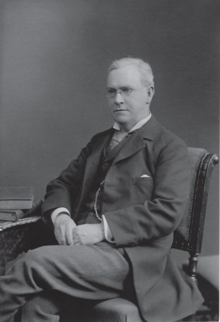Sir Horace Lamb
| Sir Horace Lamb | |
|---|---|

Horace Lamb in 1885
|
|
| Born |
27 November 1849 , Cheshire, England |
| Died | 4 December 1934 (aged 85) Cambridge, England |
| Nationality | British |
| Alma mater | Trinity College, Cambridge |
| Known for |
Lamb vector Lamb–Oseen vortex Lamb waves Lamb surfaces |
| Awards |
Smith's Prize (1872) Royal Medal (1902) De Morgan Medal (1911) Copley Medal (1923) |
| Scientific career | |
| Fields | |
| Institutions | |
| Academic advisors |
James Clerk Maxwell George Gabriel Stokes |
| Signature | |
 |
|
Sir Horace Lamb FRS (27 November 1849 – 4 December 1934) was an English applied mathematician and author of several influential texts on classical physics, among them Hydrodynamics (1895) and Dynamical Theory of Sound (1910). Both of these books remain in print. The word vorticity was coined by Lamb in 1916.
Lamb was born in , Cheshire, the son of John Lamb and his wife Elizabeth, née Rangeley, the latter a foreman in a cotton mill, who had gained some distinction by an invention for the improvement of spinning machines. John Lamb died while his son was a child. Lamb's mother married again, and shortly afterwards Horace went to live with his strict but maternal aunt, Mrs. Holland. He studied at , where he made the acquaintance of a wise and kindly headmaster in the Rev. Charles Hamilton, and a graduate of classics, Frederic Slaney Poole, who in his final year became a good friend. It was from these two tutors that Lamb acquired his taste for mathematics and, to a somewhat lesser extent, classical literature.
In 1867, he gained a classical scholarship at Queens' College, Cambridge. Since Lamb's inclination, however, was to pursue a career in engineering, he chose to decline the offer, and instead worked for a year at the Owens College in nearby Manchester, as a means of developing his mathematical proficiency further.
At that time, the Chair of Pure Mathematics at Owens College was held by Thomas Barker, an eminent Scottish mathematician, who graduated as Senior Wrangler and first Smith's prizeman from the Cambridge Mathematical Tripos in 1862. An acknowledged lecturer of high quality, Lamb prospered under the guidance of Barker, and was elected to a minor scholarship at Trinity College, Cambridge.
At Trinity, he was Second Wrangler in the Mathematical Tripos, 2nd Smith's prizeman and elected fellow in 1872. Among his professors were James Clerk Maxwell and George Gabriel Stokes. He was soon elected both a Fellow and a tutor in the college.
...
Wikipedia
